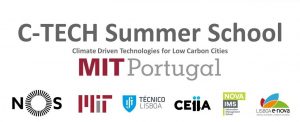C-Tech Summer School - APPLICATIONS OPEN for 15 studentships

Applications are open for 15 Scientific Initiation or Research Studentships, within the framework of project “C-Tech MIT Portugal Summer School”, under the “Verão com Ciência” call, launched by the Foundation for Science and Technology (FCT) and the General Directorate of Higher Education (DGES).
The deadline for application is JULY 27, 2020. Applications must be submitted to the email: bolsas@drh.tecnico.ulisboa.pt, with the subject: “Summer Training Program 2020″.
15 candidates will be selected to receive Research Initiation Grants (BII) and Research Grants (BI), € 412 and € 798 per month, respectively, following FCT Scholarship Regulation. These Scholarships are intended for students enrolled in a professional higher technical course, in a degree, in an integrated master’s degree, in a master’s or doctorate.
From July 29, and for 12 weeks, the selected candidates will attend a Master – Class in Smart and Sustainable Cities and will be provided with the vision of the C-Tech project, which aims at researching, developing and validating a digital smart city platform for urban modelling and planning based on the current representation of the city, including the 3D representation of the building, road and street environment, where the characterization of these elements will be based in detailed statistical information as well as high resolution engineering data.
“C-Tech – Climate Driven Technologies for Low Carbon Cities” is a MIT Portugal Program project, led by NOS, Técnico-Lisboa (IST), CEiiA, NOVA IMS, Lisboa eNOVA and MIT, and funded by ANI and FCT. C-Tech aims at developing new scientific models and components for an integrated urban modeling platform that holistically considers building energy use and resident mobility and thus provides the foundation for a range of derivative third-party services. The services will include walkability and public transportation apps, building retrofitting advice for homeowners, integration strategies of grid-scale and building-scale renewable power generation, and urban-level carbon-emission reduction scenarios.
